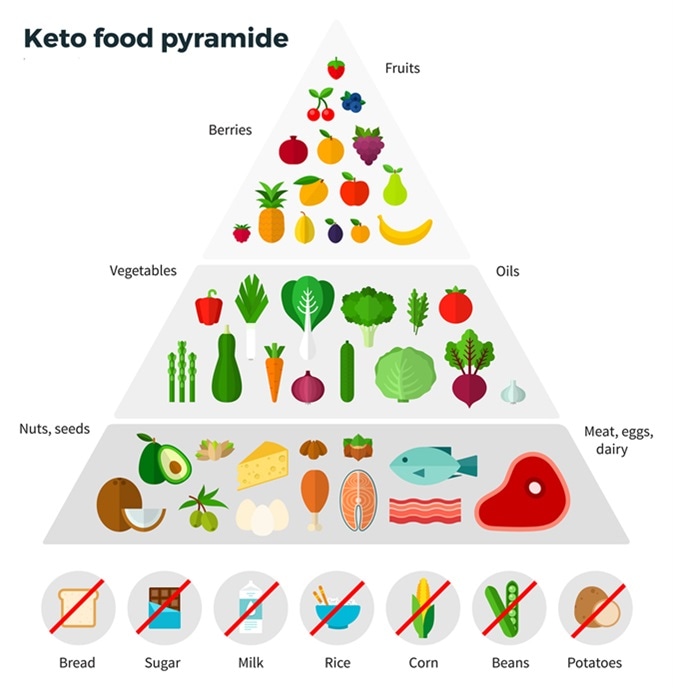As a society, Westernized people are increasingly conscious of the types of food we consume and the effect they have on weight and health. More and more people are following diet plans to manage their weight.
The ketogenic or keto diet is one commonly followed plan which shares some features with other well-known diets such as Atkins and low-carb diets. Like all diets, it provides guidance on what can and cannot be consumed.
What is the Ketogenic Diet?
The ketogenic diet is characterized by the consumption of low-carb, high-fat foods. As a consequence of eating such foods, many experience weight loss which can be extremely beneficial for those aiming to manage their weight.
This occurs as a result of the dramatic reduction in carbohydrate intake, to be replaced by fats instead, because of which the body goes into ketosis, which is a natural metabolic state. As a result, the body becomes more efficient in burning fat for energy, and it is also thought to convert ketones within the liver into energy which can be used to power the brain.

Healthy eating concept. Keto food pyramid. Image Credit: Mountain Brothers / Shutterstock
How Does Ketosis Burn Fat?
In a state of ketosis, the body’s glucose reserves become too low for normal fat oxidation and are unable to supply glucose to the central nervous system (CNS).
The CNS cannot use fatty acids as a source of energy since free fatty acids cannot cross the blood-brain barrier (BBB). After 3 to 4 days of abstinence of carbohydrates, the CNS has to find alternative energy sources.
One such source is ketone bodies (KBs), specifically, acetoacetate, β-hydroxybutyrate and acetone, which are produced primarily through ketogenesis which occurs in the liver, within the mitochondrial matrix.
Ketone bodies are a vital source of energy when the body is fasting or if there is a shortage of carbohydrates.
Best Foods to Eat on the Ketogenic Diet
Followers of the ketogenic diet are limited to 20 to 50 grams of carbohydrates per day which is roughly equivalent to one large potato and half a kilogram of vegetables.
To remain within this allowance, there are particular foods that are recommended which are lower in carbohydrates. However, it is still down to the individual to avoid the overconsumption of any food, whether they are recommended or not, as too many carbohydrates may interfere with the development of ketosis.
Fish and Seafood
Most fish and seafood is allowed on the ketogenic diet. Apart from being rich in B vitamins and potassium, these foods are also quite low in carbohydrates.
Vegetables
Overconsumption of starchy vegetables should be avoided on the ketogenic diet. However, non-starchy vegetables are recommended, especially greens such as spinach, Brussels sprouts and kale.
Research also suggests that eating such foods is associated with a reduction in the risk of developing cancer and heart disease.
Low-carb vegetables can be a good substitution for other high-carb foods, for example, rice can be substituted with cauliflower rice.
Avocados
The popularity of avocados has increased over recent years with many considering it a superfood alongside kale. In addition to containing several vital vitamins, avocados also contain potassium. It is thought that the consumption of foods rich in potassium may assist in the body’s transition into ketosis.
Worst Foods to Eat on the Ketogenic Diet
Certain foods are not recommended on the ketogenic diet as they are too high in carbohydrates.
Fruit
Despite the many health benefits of fruit, there is an issue with some fruits on the keto diet. Grapes and bananas, for instance, contain high quantities of carbs. 1 cup of grapes has approximately 26 grams and a medium banana, 24 grams of carbohydrate.
As a rule, these fruits should be avoided. However, a cup of strawberries contains 8 grams and a medium orange 12 grams of carbohydrates. Therefore these are permissible in moderate amounts on the diet.
Grains and Starches
Grains and starches should also be avoided on the ketogenic diet because of their considerably high carbohydrate content. Consumption of such foods may take the individual over the 50-gram daily carbohydrate intake.
Processed Foods
The adverse health consequences of consuming processed foods have been well documented. ON the keto diet, processed foods and trans fats should be avoided as they are high in carbohydrates.
While the ketogenic diet might be useful to those wanting to manage their weight or diabetes, some argue that there is a lack of longitudinal studies investigating the long-term impact of adopting this type of diet. Furthermore, it is suggested that individuals seek medical advice as the diet is not suitable for pregnant women and people at risk of hypoglycemia.
Further Reading
Last Updated: Dec 21, 2022